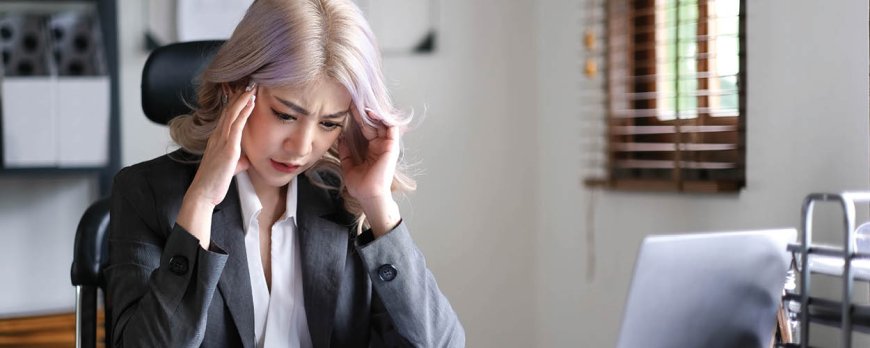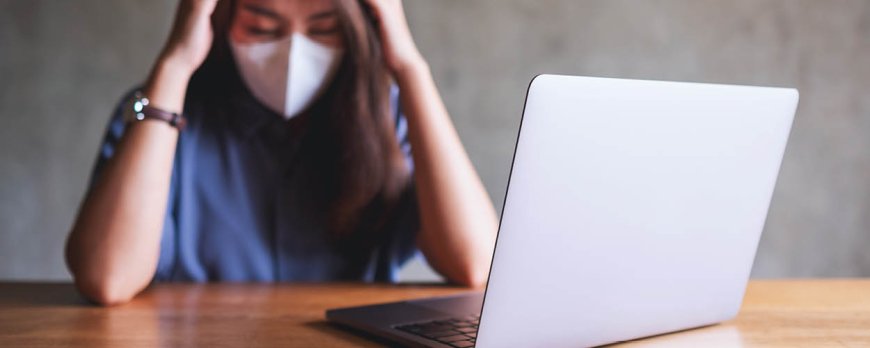What is the difference between stress and anxiety?
Explore 'What is the difference between stress and anxiety?' Unearth the contrasts, understand their impacts, and learn to manage them effectively.

What is the difference between stress and anxiety?
Stress and anxiety are common responses to certain situations, but they differ in their causes and effects. Stress is typically caused by external factors and subsides once the situation is resolved. On the other hand, anxiety stems from internal reactions and can persist even after the threat is gone.
While stress and anxiety share similar physical and emotional symptoms, such as uneasiness, tension, and sleep disturbances, anxiety is characterized by a persistent feeling of apprehension or dread. It can escalate into various anxiety disorders, such as generalized anxiety, panic disorder, and post-traumatic stress disorder.
Both stress and anxiety can be managed through relaxation techniques, physical activity, and talking about worries. However, when stress or anxiety becomes overwhelming and interferes with daily life, it is important to consider seeking professional help and treatment.
Key Takeaways:
- Stress is caused by external factors and subsides once the situation is resolved, while anxiety stems from internal reactions and can persist even after the threat is gone.
- Both stress and anxiety have similar physical and emotional symptoms, but anxiety is characterized by a persistent feeling of apprehension or dread.
- Anxiety can escalate into various anxiety disorders, such as generalized anxiety, panic disorder, and post-traumatic stress disorder.
- Both stress and anxiety can be managed through relaxation techniques, physical activity, and talking about worries.
- If stress or anxiety becomes overwhelming and interferes with daily life, professional help and treatment should be considered.
What causes stress and anxiety?
Stress can be caused by external factors such as work pressure, financial difficulties, or relationship problems, while anxiety often stems from internal worries and fears. External stressors can vary from person to person, but common triggers include deadlines, major life changes, or challenging relationships. These factors can lead to a sense of overwhelm and pressure, resulting in stress.
On the other hand, anxiety is often driven by internal thoughts and concerns. Individuals with anxiety may experience persistent worry, fear, or unease, even when there is no immediate threat or danger. Internal triggers for anxiety can include perfectionism, past traumas, or a tendency towards catastrophic thinking. These internal factors can create a sense of unease and apprehension.
It is important to note that stress and anxiety can often coexist and overlap. For example, a person may experience stress due to work demands and also develop anxiety related to the fear of failure or not meeting expectations. Understanding the underlying causes of stress and anxiety can help individuals identify effective strategies for managing and reducing these feelings.
Symptoms of Stress and Anxiety
Both stress and anxiety can manifest through symptoms like restlessness, irritability, insomnia, and difficulty concentrating. These physical and emotional signs are prevalent in individuals experiencing high levels of stress or anxiety. The body's response to stress often includes increased heart rate, muscle tension, and shallow breathing. In cases of anxiety, individuals may also experience a persistent feeling of apprehension or dread, even when there is no immediate threat or trigger.
When it comes to stress, common symptoms can also include headaches, digestive issues, and changes in appetite. Stress can impact different aspects of one's life, such as work performance, relationships, and overall well-being. On the other hand, anxiety symptoms may extend beyond the physical, leading to excessive worry, panic attacks, and avoidance behaviors.
Similarities and Differences
While stress and anxiety share many symptoms, anxiety tends to be more persistent and may develop into various anxiety disorders, such as generalized anxiety disorder, panic disorder, or post-traumatic stress disorder (PTSD). Stress, however, is often situational, triggered by external factors, and typically subsides once the stressor is removed or mitigated.
It's important to note that stress can sometimes lead to anxiety if it persists over an extended period or becomes overwhelming. This transition can be challenging for individuals, as it can significantly impact their daily lives and overall well-being. Understanding the symptoms and differences between stress and anxiety is crucial in recognizing when professional help or treatment may be necessary to manage their effects.
Next, we will explore practical strategies for managing stress, anxiety, and the importance of seeking appropriate support and treatment when needed.

Understanding the Impact of Stress
Stress, if not managed effectively, can lead to various health issues, including cardiovascular problems and a weakened immune system. When the body is under stress, it releases stress hormones like cortisol, which, in high levels, can contribute to increased blood pressure, heart disease, and other cardiovascular complications. Chronic stress can also impair the immune system, making individuals more susceptible to infections and illnesses.
In addition to the physical effects, stress can also take a toll on mental well-being. Prolonged stress can lead to symptoms such as irritability, difficulty concentrating, and emotional exhaustion. It can also contribute to the development or worsening of mental health conditions like anxiety and depression. Furthermore, stress can negatively impact one's overall quality of life, affecting relationships, work performance, and personal fulfillment.
Recognizing the Signs of Stress:
- Feeling overwhelmed or unable to cope with daily tasks
- Experiencing frequent headaches, muscle tension, or stomach problems
- Changes in appetite, either eating more or less than usual
- Difficulty sleeping or having restless sleep
- Feeling constantly fatigued or lacking energy
Managing stress effectively is essential for maintaining both physical and mental well-being. Incorporating techniques like relaxation exercises, engaging in regular physical activity, and seeking support through meaningful communication can help individuals cope with and reduce stress levels. It is important to be proactive in managing stress to prevent the development of chronic health issues and to promote overall wellness.
Understanding the Impact of Anxiety
Anxiety, unlike stress, can persist even after the triggering event has passed and can escalate into anxiety disorders such as generalized anxiety, panic disorder, or post-traumatic stress disorder. It is characterized by a persistent feeling of apprehension or dread, often accompanied by physical symptoms such as rapid heartbeat, sweating, and shortness of breath.
Common symptoms of anxiety include:
- Excessive worrying
- Restlessness or feeling on edge
- Difficulty concentrating
- Sleep disturbances, such as insomnia
- Irritability
- Muscle tension
These symptoms can significantly impact daily functioning and overall well-being. Anxiety disorders can interfere with work, relationships, and social activities, leading to a decreased quality of life for individuals experiencing them.
Types of Anxiety Disorders:
- Generalized Anxiety Disorder (GAD): Individuals with GAD experience excessive worry and tension about various aspects of life, often without a specific trigger.
- Panic Disorder: People with panic disorder have recurrent panic attacks, which are intense episodes of fear or discomfort accompanied by physical symptoms such as chest pain, dizziness, or a feeling of losing control.
- Post-Traumatic Stress Disorder (PTSD): PTSD can develop after experiencing or witnessing a traumatic event and involves intrusive thoughts, nightmares, and flashbacks related to the trauma.
Managing anxiety involves strategies such as mindfulness exercises, therapy, and lifestyle changes. By addressing the underlying causes and learning effective coping mechanisms, individuals can reduce the impact of anxiety on their daily lives and improve their overall well-being.
Managing Stress
Managing stress involves implementing strategies to reduce its impact and finding healthy ways to cope with challenging situations. Here are some practical tips and techniques for stress management:
- Practice relaxation techniques: Deep breathing exercises, meditation, and mindfulness can help relax the mind and body, reducing stress levels.
- Engage in physical activity: Regular exercise releases endorphins, which are natural mood enhancers. Find activities that you enjoy, such as walking, dancing, or yoga.
- Talk about your worries: Sharing your concerns with a trusted friend or family member can provide emotional support and perspective.
- Set realistic goals and priorities: Break overwhelming tasks into smaller, manageable steps. Focus on completing one task at a time and celebrate your accomplishments.
Remember that everyone copes with stress differently, so it's essential to find what works best for you. Experiment with various techniques and identify the ones that have a positive impact on your well-being.
Creating a Stress-Free Environment
While it may not be possible to eliminate all sources of stress, you can create a stress-free environment by implementing some lifestyle changes:
- Practice self-care: Prioritize your well-being by engaging in activities that bring you joy, such as reading, taking baths, or pursuing hobbies.
- Establish healthy boundaries: Learn to say "no" when you feel overwhelmed and avoid taking on more than you can handle.
- Manage your time effectively: Plan and organize your tasks, set realistic deadlines, and allocate time for relaxation and self-care.
- Surround yourself with support: Build a network of supportive friends and family members who can provide encouragement and assistance when needed.
Remember, managing stress is an ongoing process, and it's essential to be patient and kind to yourself. With time and practice, you can develop effective coping mechanisms and lead a more balanced and stress-free life.

Managing Anxiety
Managing anxiety involves learning techniques to calm the mind, seeking professional help when needed, and making necessary lifestyle adjustments. By implementing these strategies, individuals can effectively cope with the symptoms of anxiety and improve their overall well-being.
- Learning relaxation techniques: Practicing relaxation techniques such as deep breathing exercises, progressive muscle relaxation, and meditation can help reduce anxiety and promote a sense of calm. These techniques can be easily incorporated into daily routines and can be particularly beneficial during times of heightened stress.
- Seeking professional help: If anxiety becomes overwhelming and interferes with daily life, it is important to seek professional help. Mental health professionals can provide guidance, support, and evidence-based treatments to help manage anxiety. Therapy, such as cognitive-behavioral therapy (CBT), can be highly effective in teaching individuals coping skills and addressing underlying causes of anxiety.
Making necessary lifestyle adjustments is another essential aspect of managing anxiety:
- Engaging in regular physical activity: Physical activity has been shown to reduce anxiety by releasing endorphins, improving mood, and promoting better sleep. Incorporating regular exercise into one's routine can have significant positive effects on overall mental well-being.
- Practicing self-care: Engaging in self-care activities, such as taking breaks, pursuing hobbies, and practicing mindfulness, can help reduce anxiety and promote relaxation. Taking time to prioritize one's own well-being is crucial in managing stress and anxiety.
- Building a support network: Surrounding oneself with supportive and understanding individuals can provide a valuable source of encouragement and reassurance. Sharing concerns and seeking advice from trusted friends or family members can help alleviate anxiety and provide a sense of connection.
By incorporating these strategies into daily life, individuals can effectively manage anxiety and improve their overall quality of life. Remember, everyone's experience with anxiety is unique, so it is important to find the techniques and approaches that work best for you.
Difference between stress and anxiety disorders
While stress is a normal response to challenging situations, anxiety disorders involve persistent and excessive worry, fear, and anxiety. Understanding the differences between stress and anxiety disorders is crucial for effective management and treatment.
1. Duration and intensity
Stress is usually temporary and linked to specific situations or events. Once the stressor is resolved, the body's stress response subsides, and individuals typically return to a state of relaxation. In contrast, anxiety disorders involve chronic and intense feelings of apprehension, which can persist even in the absence of a specific trigger. Anxiety disorders often interfere with daily life, making it challenging to carry out normal activities or maintain healthy relationships.
2. Focus of worry or fear
Stress often stems from external factors, such as work deadlines, financial difficulties, or relationship problems. The focus of stress is usually centered around the specific stressor and its potential outcomes. Anxiety disorders, on the other hand, originate from internal reactions and may not have an identifiable cause. Anxiety disorders involve excessive worry and fear that may be unfocused or relate to various aspects of life, including health, social situations, or general feelings of impending doom.
3. Impact on daily functioning
While stress can impact daily functioning by causing temporary disruptions in sleep, appetite, and concentration, anxiety disorders can significantly impair an individual's ability to carry out everyday activities. Anxiety disorders may lead to avoidance behavior, social isolation, and difficulty in making decisions. The persistent and excessive worry associated with anxiety disorders can also cause physical symptoms, such as headaches, digestive issues, and muscle tension.
Recognizing the differences between stress and anxiety disorders can help individuals seek appropriate support and make informed decisions regarding management and treatment options. If stress or anxiety becomes overwhelming and starts interfering with your daily life, it is essential to consult with a healthcare professional who can provide guidance and support.
Seeking Professional Help for Stress and Anxiety
If stress or anxiety starts to significantly impact your daily functioning or quality of life, it is crucial to seek professional help from mental health providers. They can offer the necessary support and guidance to help you effectively manage and alleviate the symptoms of stress and anxiety. Here are some reasons why seeking professional help is important:
- Expertise and Guidance: Mental health professionals, such as psychologists and therapists, have the knowledge and experience to assess your condition accurately. They can provide a proper diagnosis and develop a personalized treatment plan tailored to your specific needs.
- Access to Therapeutic Techniques: Professionals can introduce you to various evidence-based therapeutic techniques that have been proven to be effective in managing stress and anxiety. These may include cognitive-behavioral therapy (CBT), mindfulness-based stress reduction, and relaxation techniques.
- Identification of Underlying Causes: Mental health providers can help identify any underlying causes or triggers of your stress and anxiety. They can explore factors such as past experiences, trauma, or other psychological issues that may contribute to your symptoms.
- Medication Management: If appropriate, mental health professionals can prescribe and monitor medication to help alleviate severe symptoms or when other non-medication interventions are not sufficient.
Remember, seeking professional help does not mean you are weak or incapable of managing stress and anxiety on your own. It is a proactive step towards improving your mental well-being and overall quality of life. Mental health providers are trained to provide a safe and non-judgmental space for you to express your concerns and develop effective coping strategies.
If you or someone you know is struggling with stress and anxiety, do not hesitate to reach out to a mental health professional. They can assist you in navigating the challenges and provide the necessary support to help you regain control and find relief.

Lifestyle Changes for Stress and Anxiety Management
Incorporating positive lifestyle changes can have a significant impact on reducing stress and anxiety levels. By making small adjustments to your daily routine and habits, you can improve your overall well-being and better manage the challenges that come with stress and anxiety. Here are some effective strategies to consider:
1. Prioritize Self-Care
Take time each day to prioritize self-care activities that promote relaxation and rejuvenation. This can include practicing mindfulness or meditation, engaging in hobbies or activities that bring you joy, taking regular breaks from work, and getting enough restful sleep. Prioritizing self-care helps to recharge your mind and body, allowing you to better cope with stressors and anxiety triggers.
2. Maintain a Healthy Lifestyle
Adopting healthy lifestyle habits can play a crucial role in managing stress and anxiety. Regular physical exercise, such as walking, jogging, or yoga, helps to release endorphins and reduce tension. Additionally, maintaining a balanced diet with plenty of nutritious foods, such as fruits, vegetables, and whole grains, provides essential nutrients that support overall well-being. Limiting the consumption of caffeine, alcohol, and sugary snacks can also help regulate mood and energy levels.
3. Build a Support Network
Having a strong support network can greatly contribute to stress and anxiety management. Reach out to trusted friends, family members, or support groups who can provide a listening ear or offer valuable advice. Sharing your thoughts and feelings with others can help alleviate stress and validate your experiences. Additionally, consider seeking professional help from therapists or counselors who specialize in stress and anxiety management if you feel the need for more structured support.
By incorporating these lifestyle changes into your daily routine, you can better cope with stress and anxiety, improving your overall quality of life. Remember, everyone's journey is unique, so it's important to find strategies that work best for you. Don't hesitate to reach out for support when needed, and always prioritize your well-being.
The importance of self-care for stress and anxiety
Practicing self-care is crucial in managing stress and anxiety, as it helps individuals recharge and maintain their overall mental and emotional health. Taking time out for oneself and engaging in self-care activities can provide a much-needed break from the demands of daily life and help alleviate the symptoms of stress and anxiety. Here are some key self-care practices that can be beneficial:
- Relaxation techniques: Engaging in activities such as deep breathing exercises, meditation, or practicing mindfulness can help calm the mind, reduce stress levels, and promote a sense of inner peace.
- Physical activity: Regular exercise, whether it's going for a walk, hitting the gym, or practicing yoga, releases endorphins, which are known as "feel-good" hormones. Physical activity not only improves physical health but also boosts mood and reduces anxiety.
- Healthy habits: Taking care of one's physical well-being plays a vital role in managing stress and anxiety. This includes getting sufficient sleep, maintaining a nutritious diet, and avoiding excessive consumption of caffeine or alcohol.
Creating a support network
Building a support network is essential for managing stress and anxiety. This can involve reaching out to friends, family, or support groups who can provide a listening ear, offer advice, or simply provide emotional support. Connecting with others who have experienced similar challenges can offer a sense of validation and reduce feelings of isolation.
In conclusion, incorporating self-care practices into daily life is crucial for effectively managing stress and anxiety. By prioritizing personal well-being and implementing relaxation techniques, physical activity, and healthy habits, individuals can improve their overall mental and emotional health. Additionally, building a support network and seeking professional help when necessary are important steps in managing stress and anxiety. Remember, self-care is not selfish; it is a necessary tool for maintaining balance and resilience in the face of life's challenges.
Conclusion
Understanding the distinction between stress and anxiety is essential for effectively managing these common challenges and maintaining overall well-being. Stress and anxiety are both normal responses to certain situations, but they have different origins and manifestations.
Stress is usually caused by external factors and subsides once the situation is resolved. It can result from work pressures, relationship issues, financial difficulties, or other life events. On the other hand, anxiety stems from internal reactions and can persist even after the threat is gone. It is often accompanied by a persistent feeling of apprehension or dread, and it can significantly impact daily functioning.
Despite their differences, stress and anxiety share similar physical and emotional symptoms. These can include restlessness, irritability, difficulty concentrating, sleep disturbances, and muscle tension. However, anxiety is characterized by a more prolonged and intense experience of these symptoms.
It's important to note that anxiety can escalate into various anxiety disorders, such as generalized anxiety, panic disorder, and post-traumatic stress disorder. These disorders may require professional help and specific treatment approaches to manage effectively.
Both stress and anxiety can be managed through various coping strategies. These can include relaxation techniques like deep breathing and meditation, engaging in physical activity, and talking about your worries with a trusted friend or therapist. Taking proactive steps to address stress and anxiety can promote a healthier and more balanced lifestyle.
If stress or anxiety becomes overwhelming and interferes with daily life, it is crucial to consider seeking professional help and treatment. Mental health professionals can provide guidance, support, and interventions tailored to individual needs. Remember, managing stress and anxiety is a journey, and there is help available along the way.
FAQ
What is the difference between stress and anxiety?
Stress is usually caused by external factors and subsides once the situation is resolved, while anxiety stems from internal reactions and can persist even after the threat is gone.
What causes stress and anxiety?
Stress can be caused by external triggers, such as work pressure or financial difficulties, while anxiety often arises from internal reactions and can be influenced by genetics, brain chemistry, and life experiences.
What are the symptoms of stress and anxiety?
Both stress and anxiety can cause physical and emotional symptoms such as uneasiness, tension, sleep disturbances, and difficulty concentrating. However, anxiety is characterized by a persistent feeling of apprehension or dread.
How does stress impact individuals?
Stress can have both short-term and long-term effects on physical health, mental well-being, and overall quality of life. It can lead to physical ailments like headaches and digestive issues, as well as emotional symptoms like irritability and mood swings.
How does anxiety impact individuals?
Anxiety is a prolonged state of worry and apprehension that can escalate into various anxiety disorders, such as generalized anxiety, panic disorder, and post-traumatic stress disorder. It can significantly interfere with daily functioning and overall quality of life.
How can stress be managed?
Stress can be managed through relaxation techniques such as deep breathing and meditation, engaging in physical activity, and seeking support from friends, family, or professionals. Effective communication and setting boundaries are also helpful strategies.
How can anxiety be managed?
Managing anxiety often involves a combination of strategies, including therapy, medication, mindfulness exercises, and lifestyle changes such as practicing self-care, maintaining a balanced diet, and getting regular exercise.
What is the difference between stress and anxiety disorders?
While stress is a normal response to certain situations, anxiety disorders are characterized by persistent and excessive worry or fear that can significantly impact daily life. Common anxiety disorders include generalized anxiety disorder, panic disorder, and social anxiety disorder.
When should I seek professional help for stress and anxiety?
If stress or anxiety becomes overwhelming and interferes with your daily life, it is important to consider seeking professional help. Mental health professionals can provide guidance, support, and appropriate treatment options to help manage stress and anxiety effectively.
What lifestyle changes can I make to manage stress and anxiety?
Making healthy lifestyle changes can significantly contribute to stress and anxiety management. This includes practicing self-care, maintaining a balanced diet, getting regular exercise, establishing a consistent sleep routine, and building a strong support network.
Why is self-care important for stress and anxiety management?
Self-care plays a crucial role in managing stress and anxiety. Prioritizing your well-being and engaging in self-care practices, such as taking breaks, engaging in hobbies, and practicing relaxation techniques, can help reduce stress levels and promote overall mental health.


































































































































